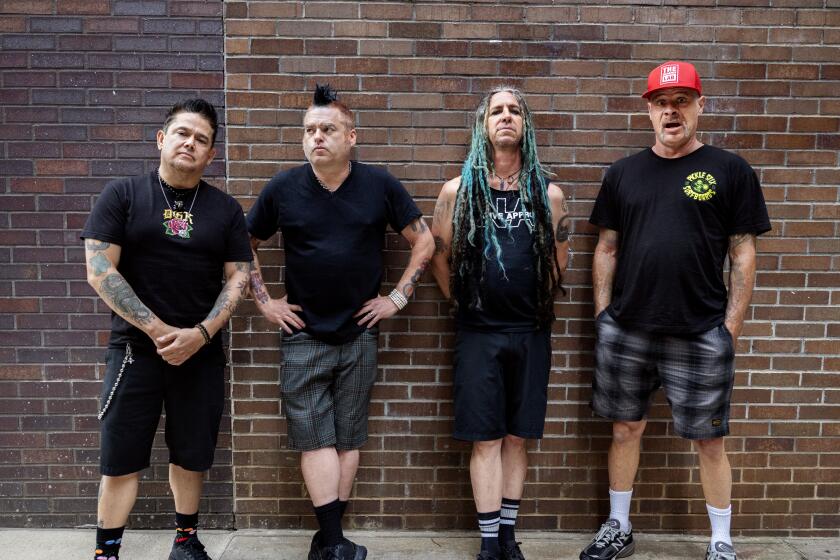Tony Allen, famed Afrobeat drummer with Fela Kuti, dies at 79
Tony Allen, who drummed his way out of Lagos, Nigeria, with Fela Kuti to become an architect of the Afrobeat sound, has died. He was 79.
Allenâs work on percussion starting in the mid-1960s set in motion a seemingly endless rhythm that first upended a city, then a continent and, finally, the world. Famously, Brian Eno called him the best drummer that ever lived.
Allenâs death in his longtime home of Paris was confirmed by Eric Trosset, his manager.
âHe was in great shape,â Trosset told the Guardian. âIt was quite sudden. I spoke to him at 1 p.m., then two hours later he was sick and taken to Pompidou hospital, where he died.â He added that Allenâs death was not thought to be related to COVID-19.
The Los Angeles Times will provide around-the-clock updates on COVID-19 from across Southern California and around the world.Tracking the coronavirus in California: latest numbers | Support our journalism with a subscriptionHave a question about coronavirus? Send us your questions here. | You also can sign up for our newsletterSee latest photo galleryCoronavirus updates for April 29 are here
United as postcolonial strife was consuming their country, Kuti and Allen drew on Nigeriaâs pop music of the time, called high life, in their early work. But, as retold in the hit Broadway musical âFela!,â during a visit to Los Angeles in 1969, Kuti, Allen and the rest of the band converged with area Black Panthers through activist Sandra Isadore. Emboldened, the band returned to Lagos and energized the country with combative, Allen-propelled drum riots.

Although forever connected to Kutiâs projects, most notably Africa 70, Allenâs percussion work continued to evolve after he left Kutiâs circle in the early 1980s. Teaming with the New York/Paris imprint Celluloid, Allen beefed up his bottom-end tones, pushing up the levels on the recording mikes closest to his kit to make sounds informed by the hip-hop-fueled 1980s. He continued to embrace any style that needed a beat, including techno and house music. Released just last month was a new album, âRejoice,â of him with South African bandleader Hugh Masekela, who died in 2018..
Among others, across his life Allen worked with Charlotte Gainsbourg, Angelique Kidjo, Malian singer Oumou SangarĂŠ and Detroit techno producer Jeff Mills. Starting in the mid-â00s, Allen began an extended collaboration with Blur singer Damon Albarn, with whom he formed a supergroup called the Good, the Bad and the Queen. A few years later, he and Albarn joined Red Hot Chili Peppers bassist Flea to form Rocket Juice and the Moon.
Born in Lagos in 1940, Allenâs rhythmic journey began as if with his first heartbeat. His father was Nigerian, his mother Ghanaian. According to Allen biographer Michael E. Veal, his desire to play music for a living was at first cause for concern in the conservative family. Needless to say, the beat prevailed. Obsessed with American jazz and Nigerian jĂšjĂş music, a teenage Allen started playing with a series of small bands, including the African calypso band Agu Norris & the Heatwaves, before being hired by Kuti in 1964.
âI think it was Blue Note, really, that revealed the most jazz to me,â Allen told Clash magazine in 2017. Specifically, in drummer Art Blakeyâs work, Allen said, âI was hearing the similarity of things in American drums, playing things that I already knew.â When he learned that Blakey had journeyed to Africa to expand his own skills, Allenâs muscles pushed his sound further afield. âThis combination of us with this guyâs playing â I could see us in there. The way he was playing, it wasnât like other drummers. Thatâs why I tried to follow up these ideas.â
Kuti and Allen forged a musical bond that drove Kutiâs band to international fame. The politically minded Kuti channeled his voice and words to foment political change. As he did so, Allen drove a rhythm section that he controlled. His creative power and vision ultimately drove a wedge between him and his collaborative partner; it was Allenâs beat but Kuti was getting all the royalties.
After striking out on his own, Allen became the only Kuti collaborator to maintain the publicâs attention. Even as Kutiâs sons Femi and Seun forged new sounds based on their fatherâs vibrations, Allen insistently kept his sticks at the ready. Once moving, they tapped out immediately identifiable beats.
Asked by British publication the Quietus about his influence, Allen said, âAfrobeat has many different grooves. Afrobeat is not actually one particular beat. What I am doing when I am playing, is I am creating patterns.â
Remixers and beat producers lapped up those patterns. For her 2001 Timbaland-produced track, âWatcha Gonâ Do?,â Missy Elliott tapped Allenâs rhythm from Kutiâs 1977 song âColonial Mentality.â The beat from Nas and Alicia Keysâ âWarrior Songâ is driven by an Allen beat from Kutiâs âNa Poi.â When BeyoncĂŠ conquered Coachella in 2018, her âDĂŠjĂ Vuâ burst of brass and beat came via Allen and Kuti. Burna Boy, Mos Def, Fatboy Slim, Masters at Work, Motor City Drum Ensemble, Ricardo Villalobos, Common â all used Allenâs work through samples.
Unlike some successful drummers, Allen never begrudged such borrowing. It only helped to further spread his beat. The most identifiable of his tics: a snare snap that hit with a textural looseness that suggested the hint of a roll. Those snare tones lasted only milliseconds, though, and were surrounded by a chalkboardâs worth of rhythmic equations calculated on floor toms, cymbals, kick drums and hi-hats. With arm-blurring quickness, he configured time signatures with an Einsteinian understanding of mathematical patterns.
He told British magazine the Wire of one epiphany involving the use of his feet as if he were riding a bicycle: âYou have good legs, you have pedals, you need to put [your feet] on both pedals to make you move,â he said. âYou canât start riding a bicycle with one leg, when you have two legs and the other pedal is there.â

Allen released his first solo record, âJealousy,â in 1975. Recorded with Africa 70, it grooves like a Kuti album â minus the vocal invectives and plus many sublime moments of Allen peacocking behind his kit. âN.E.P.A. (Never Expect Power Always),â from 1984, confirmed a drummer well on his way to becoming his own brand and eager to groove with the times. The song stretched to nearly eight minutes. The 12-inch version, featuring two wild dub versions, overtook dance floors in Paris, London and New York. According to online database Discogs, Allen released two dozen albums either solo or in collaboration with others.
His most recent solo album, âThe Source,â came out in 2017 via Blue Note in France, the same year he issued his four-song âA Tribute to Art Blakey and the Jazz Messengers.â The closing song on âThe Sourceâ was an instrumental called âLife Is Beautiful.â That it required no lyrics was apparent in every drumbeat.
Allen is survived by his wife and three sons.
âI just wanted to make sure I used this instrument the way it was put in front of me,â he told the Wire. âMeaning that, itâs four limbs. You have to use your four limbs.â
More to Read
The biggest entertainment stories
Get our big stories about Hollywood, film, television, music, arts, culture and more right in your inbox as soon as they publish.
You may occasionally receive promotional content from the Los Angeles Times.









